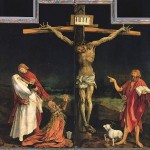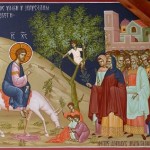 Matthew 26:47-56
Matthew 26:47-56
Today we come to the Word of God.
When we say “the Word of God,” we often use it in 2 different senses of the Word. We say, on the one hand, that the Bible is the Word of God. In its strongest sense, we see this when the prophets say things like, “Thus says the Lord.”
We also use “the Word of God” to mean the Son of God, Jesus Christ, the Word made flesh. In both cases we have the revelation of God to man, and the two are joined more intimately than we can imagine.
But today, I see before me a strange dance. I see, on the one hand, the Word of God, those ancient prophecies of the Israelites, spoken by the prophets of old. Matthew, especially, pays attention to the fulfillment of Scripture, especially at both the beginning and the end of His Gospel. “So all this was done that it might be fulfilled which was spoken by the Lord through the prophet, saying, ‘Behold, the virgin shall be with child, and bear a son, and they shall call his name Immanuel,’ which is translated, God with us” (Matthew 1:23, quoting Isaiah 7:14). Matthew also draws attention to the fulfillment of Micah 5:2, about the shepherd who would come from Bethlehem; to the fulfillment of Jeremiah 31:15 and lamentation of Rachel weeping for her children at the slaughter of the innocents; and to John, the voice of one crying in the wilderness spoken of in Isaiah 40:3.
Something interesting happens in Matthew 26: we see Jesus, the Word of God, choosing to lead a life that will fulfill the perfect will of the Father, as spoken through those ancient prophecies. Here, in Matthew 26, we see the ancient, immovable, written Word of God spread out before us. And here, in Matthew 26, we see the living, incarnated Word of God changing the steps of His life to be in perfect harmony with the Word, the will of the Father, spoken by the prophets.
This conforming of the will to the will of the Father is no easy thing for Jesus, and we’re mistaken if we think it is. Have we, like the disciples, fallen asleep so soon? Don’t you remember the agony of the Lord in the Garden of Gethsemane, immediately after which the betrayer and the armed multitude came for Him? He’s just asked for the Father to take this terrible cup from Him.
Leave it to Peter to offer a way for Jesus to avoid the will of the Father. Good old Peter. The one who would not have his feet washed by his Master, the one who denied that the Son of Man should ever go to Jerusalem to suffer and die, is now the one who would stop this prophecy one way or the other. Poor Peter! One little sword among so many swords and clubs and men. It’s a good thing Jesus intervened. Little did Peter know that Jesus could have defended Himself very easily. He could have called twelve legions of angels to protect Him.
But there’s that little matter of the Word of God, which Jesus knew must be obeyed. How could the Scriptures be fulfilled, if Jesus had delivered Himself? How could the will of the Father be kept if He chose His own will instead?
Jesus seems almost amused by what is happening. Was it really necessary, He asks them, to bring so many men, with swords and clubs? He was theirs for the taking any time earlier. Aren’t these rather bizarre circumstances under which you’re arresting Me? It’s as if Jesus is, even at the last, teaching, teaching them that the secret betrayal and seizure at night, all the Mickey Mouse trials He’ll undergo, the Crucifixion – all of it– suggest that something very strange and momentous is taking place.
Even the end of verse 56 is a fulfillment of the Word of the Lord, even if it’s only me and not St. Matthew that’s pointing it out. “Then all the disciples forsook Him and fled.” “Strike the shepherd, and the sheep will scatter.”
It’s tempting to admire Matthew’s cleverness in putting together a story that manages to cobble together so many different Old Testament prophecies. What an insightful writer he is! Of course, it was Matthew who learned to correctly understand the Old Testament from Jesus, and not the other way around.
What strikes me today about how Jesus the Word of God submits to the will of the Father through the written Word of God of the Scriptures is this: that because He knew the Scriptures, He knew what He had to do. And then, knowing and loving the Father, He did it.
The same is true for you today. If you know the Word of God, intending to do the will of the Father, then you will know what you need to do. I’m not saying that if you randomly open up your Bible to a verse that you’ll suddenly be enlightened as to what to wear this morning or whether you should get the grande or the venti at Starbucks. But if you know the Word of God, then you will know the will of the Father in all of the important things.
In fact, since I’m assuming that many, if not most, of you know your Bibles well, that if you just sit still for a few moments, God’s will for your life would come streaming into it. Probably more than you want it to. I’m not saying it’s magic, but if you put together the written word of God and an honest heart that truly desires the will of the Father, there’s a good chance you’ll end up with wisdom, and the blessing of having done the will of the Father.
This provides an enormous incentive to know the Word of God better. It’s no use cutting corners, and a lazy hermeneutics that reads verses out of their larger context have often gotten men into trouble. But as you learn to read the Word of God richly and deeply so that it gets into the fibers of your muscles and the fissures of your brain and the blood of your heart, then learning and following the will of the Father becomes possible. For when you read the Word of God in this way, you are united to the Word of God, the incarnate One who not only perfectly understood but also perfectly obeyed the written Word.
When you submit yourself to the Word of God, seeking the will of the Father, then you, too, will be enabled to endure the Gethsemanes God has willed for your life.
Prayer: Our Father, who art in heaven, hallowed be Thy name. Thy kingdom come. Thy will be done, on earth as it is in heaven. Give us this day our daily bread. And forgive us our trespasses, as we forgive those who trespass against us. And lead us not into temptation, but deliver us from evil. For thine is the kingdom, and the power, and the glory, for ever and ever. Amen.
Points for Meditation:
1. Meditate on your life in reading the Word of God. Is there some aspect of reading, studying, or meditating on God’s Word that He is calling you to work on?
2. What aspects of His perfect will does the Father seem to be impressing on you today through the Holy Spirit?
Resolution: I resolve to read the Word of God tomorrow (you’ve just done it for today!), looking for His will for my life.
© 2012 Fr. Charles Erlandson
Arrest of Christ by Great Shelford Free Church youth group.jpg











